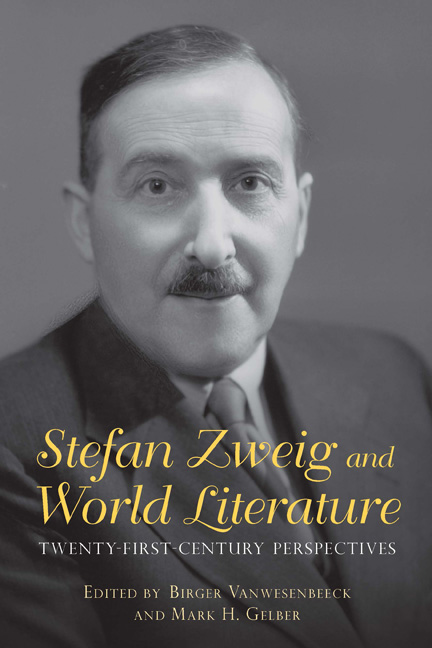Book contents
- Frontmatter
- Dedication
- Contents
- List of Illustrations
- Acknowledgments
- Introduction
- Part I Reception
- Part II Drama and Fiction
- Stefan Zweig's Drama Jeremias in Context
- 3 “That Voice in the Darkness!”: Technologies of the Tropical Talking Cure in Stefan Zweig's Der Amokläufer and Verwirrung der Gefühle
- 4 Narrating Alterity: Stefan Zweig, Emmanuel Levinas, and the Trauma of Redemption
- Part III Criticism and Essays
- Part IV Politics and Exile
- Notes on the Contributors
- Index
Stefan Zweig's Drama Jeremias in Context
from Part II - Drama and Fiction
Published online by Cambridge University Press: 05 May 2015
- Frontmatter
- Dedication
- Contents
- List of Illustrations
- Acknowledgments
- Introduction
- Part I Reception
- Part II Drama and Fiction
- Stefan Zweig's Drama Jeremias in Context
- 3 “That Voice in the Darkness!”: Technologies of the Tropical Talking Cure in Stefan Zweig's Der Amokläufer and Verwirrung der Gefühle
- 4 Narrating Alterity: Stefan Zweig, Emmanuel Levinas, and the Trauma of Redemption
- Part III Criticism and Essays
- Part IV Politics and Exile
- Notes on the Contributors
- Index
Summary
It makes sense to reconsider stefan zweig's place as a dramatist in the history of interwar German drama because literary criticism, from Bernhard Diebold onward, has not dealt kindly with Zweig's drama. Indeed, few critics writing of German drama between the wars mention him at all. There is only one book devoted to Zweig's drama, by the French critic Robert Dumont. The article on Austrian drama in a recent compendium of essays on twentieth-century Austrian literature is symptomatic of the continued lack of interest in Zweig's drama elsewhere: it contains but two brief references to the drama Jeremias (Jeremiah, 1920) and no reference at all to any of his other plays. However, like so many Austrian writers of his generation, Stefan Zweig was prepared to tackle every literary genre, and as a son of Vienna, which some have called a “theater city,” it is not surprising that early in his literary career, in 1905–6, he, too, tried his hand at drama with Tersites, a play in verse about “the fate of the most ugly and most malignant of the Greeks before the walls of Troy.” But, as his autobiography makes clear, Zweig's attitude towards writing drama was conditioned by a series of tragic events surrounding three actors who were slated to act in his plays, but died before the plays could be performed. Nevertheless, the complete edition of his dramas contains fourteen plays written between 1907 and 1935. Five of these were translations: three of dramas by Émile Verhaeren and, more significantly in the context of this essay, an excellent translation of Romain Rolland's Le temps viendra (The Time will Come, 1902). The latter was a powerful anti-war drama set in the Boer War, first performed in Vienna in 1921 and later produced by Erwin Piscator in Berlin in 1923. These productions were followed by a free adaptation of Ben Jonson's comedy Volpone, based on a cursory reading of the play's outline in Taine's Histoire de la littérature anglaise.
- Type
- Chapter
- Information
- Stefan Zweig and World LiteratureTwenty-First Century Perspectives, pp. 35 - 55Publisher: Boydell & BrewerPrint publication year: 2014



